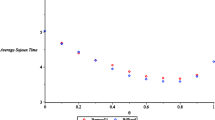Abstract
Minimizing total tardiness in the model of an identical parallel-machine with nonpreemptive jobs of the worker assignment scheduling problem is further studied in this paper. More complicated simulation processes are established for this purpose. The specific worker assignment scheduling problem is solved in two parts of job scheduling and worker assignment. The S_PT, E_DD, S_lack (SES) heuristic is used for the job scheduling part while the largest marginal contribution (LMC) procedure is used to for the worker assignment part and then minimizes the total tardiness. From the new simulations conducted, the heuristics developed have again shown very convincing results quite efficiently.
Similar content being viewed by others
References
Hu P (2004) Minimizing total tardiness for the worker assignment scheduling problem in identical parallel-machine models. Int J Adv Manuf Technol 23:383–388
Elmaghraby SE, Park SH (1974) Scheduling jobs on a number of identical machines. AIIE Trans 6:1–13
Du J, Leung JY-H (1989) Complexity of scheduling parallel task systems. SIAM J Discrete Math 2(4):473–487
Ghosal D, Serazzi G, Tripathi SK (1991) The processor working set and its use in scheduling multiprocessor systems. IEEE Trans Softw Eng 17(5):443-453
Feitelson DG, Rudolph L (1992) Gang scheduling performance benefits for fine-grain synchronization. J Parallel Distr Comput 16(4):306–318
Wand Q, Cheng KH (1992) A heuristic of scheduling parallel tasks and its analysis. SIAM J Comput 21(2):281-294
Hurink J, Knust S (2001) List scheduling in a parallel machine environment with precedence constraints and setup times. Oper Res Lett 29:231–239
Sule DR, Vijayasundaram K (1998) A heuristic procedure for makespan minimization in job shops with multiple identical processors. Comput Ind Eng 35(3–4):399 – 402
Gupta JND, Maykut AR (1973) Scheduling jobs on parallel processors with dynamic programming. Decis Sci 4(4):447–457
Rothkopf MH (1966) Scheduling independent tasks on parallel processors. Manage Sci 12(5):437–447
Dogramaci A, Surkis J (1979) Evaluation of a heuristic for scheduling independent jobs on parallel identical processors. Manage Sci 25(12):1208–1216
Ho JC, Chang YL (1991) Heuristics for minimizing mean tardiness for m parallel machines. Navel Res Logist 38:367–381
Koulamas C (1997) Decomposition and hybrid simulated annealing heuristics for the parallel-machine total tardiness problem. Naval Res Logist 44:109–125
Park M-W, Kim Y-D, (1997) Search heuristics for a parallel machine scheduling problem with ready times and due dates. Comput Ind Eng 33(3–4):793–796
Author information
Authors and Affiliations
Corresponding author
Rights and permissions
About this article
Cite this article
Hu, PC. Further study of minimizing total tardiness for the worker assignment scheduling problem in the identical parallel-machine models. Int J Adv Manuf Technol 29, 165–169 (2006). https://doi.org/10.1007/s00170-004-2487-7
Received:
Accepted:
Published:
Issue Date:
DOI: https://doi.org/10.1007/s00170-004-2487-7




